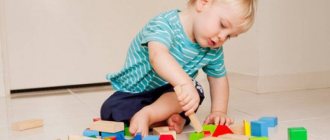Music has always played a big role in human life. its diverse influence has long been noticed and is still being constantly studied, gradually revealing its secrets. It’s surprising but true that the pyramids of Egypt generate sounds that were recorded using equipment in the 20th century.
Infrasound cannot be heard by people, but it causes inexplicable panic. And the harmonious sound of a melody can awaken certain emotions, create a mood, have a relaxing effect and sharpen perception. Young children are especially sensitive to music. According to research results, the greatest response is caused by classical works of the early period.
Harmonious and verified in structure and sound, they have a beneficial effect on brain activity, improve memory and imaginative thinking, teach linear perception in several planes simultaneously, which enhances the development of mathematical abilities.
Feature of classical music
At what age can a child listen to music?
We all know that for the first 1.5 weeks the baby is under the protection of nature, that is, he still hears and sees poorly, so as not to be afraid of the noise and brightness of this world. However, he perfectly feels kindness and tenderness, he enjoys gentle words and slow melodies. Therefore, a child can listen to music from the first days of his life, but the most important thing is not to overdo it.
The baby’s brain receives such a colossal amount of information every day that we need to help him assimilate it correctly. In order for a child to develop both hemispheres of the brain equally well, it is necessary to listen to music, because it is the melody that is perceived by both hemispheres, improving interhemispheric and intrahemispheric connections.
What kind of music can children play?
Music for newborns should be melodic and quiet. Children can play pleasant classics (Beethoven, Mozart, Vivaldi), modern instrumental calm music, or purchase special melodies for children, which have already been converted into ear-pleasing compositions by sound masters. Hearing melodic music, the baby immediately calms down and becomes quiet, listening to the rhythm he likes. If the music is cheerful, then the baby’s movements will be more animated, and he will begin to smile.
The more calm and melodic music a child hears from the first days of life, the more balanced he will be in the future. When you put your baby to bed, sing him lullabies or just talk to him, and play music quietly in the background - this will calm the baby down, and he will quickly fall asleep in a sweet dream. In addition, it has been proven that while listening to pleasant, calm music, digestion occurs faster and better, which is extremely important for the well-being and good sleep of our little ones.
When you choose music for your baby, avoid tunes that feature percussion instruments. They will have a zombie-like effect on the child (as well as on the psyche of an adult), so the baby can be capricious, nervous, and restless.
Remember that children also love fun, and when they are in a good mood, they like ri, to which they want to dance. Kids who have just learned to stand on their little legs are already trying to bend their knees to the beat of the music, or laugh loudly when they hear unusual sounds that can now be downloaded from the Internet. To rhythmic music, a child wants to move and play, and this develops a cheerful and active personality in him. Children who listen to music from childhood develop and learn about the world much faster. However, music should be varied - classical, pop, jazz, and folk music - with diversity in music, the child absorbs diversity in life and develops comprehensively.
Gnomik.ru recommends Rmh24.ru Refrigerator repair at home from Rmh24 We repair refrigerators of all brands. Free visit of a specialist and diagnostics!
Use promo code: Gnomic.ru
and get a guaranteed 10% discount
We work in Moscow and the region.
Call
Call a specialist
What can music do?
According to scientists, both hemispheres of the brain hear a melody, with the right hemisphere perceiving timbre (a special coloring of sound, which is different for each instrument and voice), and the left hemisphere perceiving rhythm (the ratio of the duration of sounds).
It is believed that rhythm has the greatest impact on the body. Our body begins to adapt to the melody we listen to. The rhythm with a frequency of 2-4 vibrations per second is very close to our heartbeat and breathing, so such melodies can have a calming effect. Melody can also influence our physiology, acting on the nervous system and regulating biorhythms.
What is the treatment with music?
- First of all, it is used to correct the mental state of school-age children. This could be a fight against childhood fears, worries, and emotional deviations.
- Music helps with insomnia and also serves as a stimulant for good mood.
- Usually, for children of primary school age, it is recommended to study music to develop memory, which is so necessary in the first stages of education; art helps them in creativity.
- Music therapy helps cope with age-related transition periods in a child’s development.
- Music perfectly develops fantasy and imagination in primary school children, because it leads to the emergence of emotions, followed by visual images. The older the child gets, the brighter these images will be.
- The formation of aesthetic taste is also within the purview of musical art. Classical works—sound standards—are well suited for this purpose. But we should not forget about folklore - a storehouse of wisdom of our ancestors, which allows us to join Russian culture.
Musical tales
In addition to just music (classical or pop), a child needs to listen to musical fairy tales, cartoons in which they sing and play musical instruments. After all, a child learns all the wisdom of life, the whole world through fairy tales, through cartoon characters - they occupy him and bring to his understanding more words than you can imagine. For example, the cartoon “How the Turtle and the Lion Cub Sang a Song” teaches a child friendship, and kids happily repeat the song about how the lion cub “lies in the sun.” No less instructive is “The Tale of Tsar Saltan,” which is easily remembered for its poems, and especially for the song of the squirrel, which “gnaws everything on nuts.” Kind songs combined with interesting fairy tales develop a responsive and pleasant personality in a child.
How to develop a child with the help of music?
There are several ways to introduce your toddler to music:
- Sing him lullabies - even if the mother does not have an ear for music or a voice, this is not a problem. For the baby, her voice is the most pleasant sound in the world. It is enough to learn a few children's lullabies and perform them in an intonation and timbre that is pleasant for the little one. It is best to sing lullabies before going to bed at night.
- Place a musical block with toys above the crib - the musical compositions of such a device are created specifically for babies and are designed to relax and calm them, and toys of bright colors allow you to expand the child’s perception. It would also be a good idea to buy your little one several musical toys, which he can turn on independently a few months after birth. They will help develop not only hearing, perception and motor skills, but also the intellectual abilities of the growing child.
- Playing CDs with classical music for your child means that the child’s perception is not yet spoiled as much as that of an adult. Children really like compositions by Chopin, Mozart, Grieg, Tchaikovsky, Vivaldi and other classics. The sounds of birdsong, the murmur of a stream, the sound of waves, rain and other music of nature have a beneficial effect on the toddler’s central nervous system.
- Let your child listen to musical fairy tales and watch funny cartoons with a lot of songs . When the baby grows up and begins to recognize the melodies that he heard during the newborn period, the little one will rejoice and experience positive emotions.
Psychologists recommend using the Zheleznovs’ music library for the early development of children. It consists not only of children's musical compositions, but also of fairy tales, folklore elements, games and nursery rhymes.
The influence of classical music on a child
The opinions of adults are divided into two camps - some say that classical music is too difficult for young children, while others insist that it is classical music that cultivates aesthetic taste in children. However, it doesn’t matter to children how you feel about this music - every child is intuitively drawn to one sound or another, regardless of your personal preferences. For example, many children calm down when they hear the melodies of Tchaikovsky, Beethoven, Vivaldi, but children are wary of Bach, with his organ music that is somewhat difficult to perceive, because such a deep sound causes anxiety in them.
The positive influence of classical music on children has been proven by scientists, and they say that it is a certain frequency of acoustic waves of classical works that affects the child’s pleasure centers and promotes the development of brain activity. For example, Mozart’s music makes it easier for the baby to perceive everything new and stimulates memory, so his works can be played for the baby in between educational games.
With the help of classical works, you can even correct the emotional state of the baby. So, for example, to calm a child, you can turn on works by Beethoven, Brahms, Schubert, to improve his mood, turn on Tchaikovsky, to increase activity, let the baby listen to Liszt, Mozart, Khachaturian, and to reduce feelings of uncertainty and anxiety, it is recommended to turn on the waltzes of Strauss, Rubinstein , works by Chopin.
You should not force a child to listen to classical music, because not even every adult is able to cope with 10 minutes of listening to classical music. Try to play different works for your child every day and take a closer look at how he reacts to them. Surely some will calm him down, while others, on the contrary, will encourage him to inexplicably capricious actions. After a while, you will be able to select a list of works that have the most beneficial effect on the baby.
Classical music phenomenon
In Ancient Greece, music training was mandatory for the scions of noble families, along with martial arts, physical training and rhetoric. Moreover, each fret was assigned a certain influence on character traits, and a kind of music education was carried out. Until the age of 7, a child is maximally open to comprehending new things; he learns the world through the active exploration of space, including through sounds. And he begins to hear and distinguish them even before he is born.
It is interesting that the baby perceives sound on an intuitive level, and the works of J. S. Bach, filled with deep philosophical meaning, or the symphonies of Beethoven, permeated with a rebellious spirit, are listened to by young children without interest or visible effect.
But the transparent music of Wolfgang Amadeus Mozart can sound to them for hours. Her secret is simple and complex at the same time. First of all, the personality of the composer leaves its mark. He had a difficult life, filled with constant work from an early age. But until the end of his days he retained the spontaneity and light of his soul, sincerely admiring the world, conveying his admiration through musical images. Therefore, most collections of classical music for children include his “Lullaby”, “Rondo in Turkish Style”, “Little Night Serenade”, overtures to the operas “Figaro” and “The Magic Flute”, minuets, sarabands, and piano miniatures.
Descendants called Mozart the “sunny composer” for the bright energy that he generously shared with listeners.
Music has always influenced people
Should I send my child to a music school?
If at least one of the child’s relatives has a good voice and hearing, then it is quite natural that the child is not deprived of musical abilities. You can verify this by sending your child to a music school. Today it is much more prestigious to teach a child English, rapid reading and writing than to learn music, but music plays an important role in the development of a child’s personality. Perhaps your child will like the choice of instrument that you offer him, or maybe he himself has his eye on a piano or violin. Children often strive to imitate their idols, and if your child’s favorite actor in some movie sits in a black tailcoat at the piano and plays a beautiful melody, then the child may become attracted to this instrument and ask you to teach him to play it.
What will a child receive at a music school? First of all, this is musical literacy, aesthetic taste and the concept of beauty. Few children at an early age understand the true meaning of the works of the classics, but they try their best to convey them to listeners in their own way. The child learns to hear the subtlest changes in music, to understand its nuances and mood, and over time he will learn to hear these changes in human speech - to notice the slightest changes in the mother’s intonation or the teacher’s unnoticeable dissatisfaction. With the help of music, a child learns to communicate with people, to capture the mood of the interlocutor, his emotional state. In addition, the influence of music on a child’s development is undeniable in the development of perseverance, patience, and systematic work.
However, it would be a mistake to think that if you send your child to a music school, he will immediately become diligent and sensual. Many children don’t even last a year in music school because they are bored there, they need to learn a lot of terms they don’t understand, understand them, and repeat the same melodies at home day after day. So if your child resists such teachings, do not scold him, because not everyone grows up to be famous musicians; for many, musical education simply gives another page of variety in life, and nothing more.
From the history of music therapy
The first to note the healing effect of music on the human psyche was the Greek philosopher Pythagoras.
He saw in melody the ability to restore spiritual harmony. By the 20th century, several schools supporting music therapy had emerged.
- The Swedish concept proved the ability of music to penetrate deep into the human consciousness and alleviate the condition through relaxation. They selected musical works that could evoke emotions.
- German psychotherapists emphasized the impact of art as a whole.
- Americans have developed music catalogs from a variety of genres that can soothe and stimulate.
- In Switzerland, vocals and playing the flute were preferred because of the ability to involve the respiratory organs in the process.
- In Russia, neurologist Bekhterev began researching the influence of music on children’s bodies.
He noted the ability of melody to influence the development, improvement and preservation of children's health.
This is interesting! Japanese scientist Emoto Masaru conducted a series of experiments proving the influence of music on water crystals. The water, which “listened” to classical melodies, lined up in the form of clear crystals of an elegant shape, but loud and aggressive rock led to the appearance of disordered and irregular shapes in the crystals. Now think about it: the human body contains an average of 70% water!
Not all music is created equal
If the music for your child is chosen correctly, then you will ensure the improvement of your child’s motor coordination, short-term memory, and the formation of a good mood.
But what will happen to a child’s feelings if you play rock or other heavy music for him? Like any living plant or animal, a person reacts to heavy rock with a complete lack of understanding of what is happening. Because of the loud and gloomy performance, plants do not want to grow, cows do not want to give milk, and snowflakes turn into a real disgrace, losing their ideal symmetrical shape. People are part of nature, and the influence of heavy music on a child’s development is also detrimental, because when listening to such rock compositions, a stress hormone is released that can erase information from the brain.
How does music influence a child's personality development?
- Develops a sense of musical taste;
- Instills emotional responsiveness;
- A child will be more happy to do physical exercises with music than without it. Rhythmic exercises accompanied by music improve coordination of movements, the child’s posture, clarity of movements and walking;
- Singing to music strengthens the vocal cords, develops speech, the correct posture of the singer deepens his breathing;
- Playing musical instruments, singing, and dancing develop children's attention, organization, speed of reactions, and fine motor skills of the fingers;
- Children perceive musical fairy tales much easier than those simply read by their mother, since they are easier to remember. They broaden the kids' horizons;
- Easily excitable children are advised to listen to calm music to balance their inner world;
- Musical classes in a group lift the child’s mood; under the influence of properly selected rhythmic music, various games and activities, children learn to play and communicate with each other, the fear of “new people” goes away;
- Boys and girls who have a musical education, know how to play musical instruments, sing, are less likely to end up in bad company than those children who are far from music. Music develops a disciplined and responsible personality in a child, distracts the cognitive brain from dangerous hobbies and gives him a positive, right direction in life.
Child development
Rating 30Music lessons develop a child's cognitive abilities and social skills |
- Type
- Ask
- Send to a friend
- Share
- subscribe to news
Recent studies by psychologists have shown that teaching children music and even simply listening to music contributes to the development of children's brains. At the same time, other studies have shown that if parents listen to music, sing songs or dance with their children, this has a positive effect on the relationship between them.
In other words, music has many benefits for children. Let's take a closer look at them.
The influence of music on children's brain development
Studies using various neuroimaging techniques have shown that teaching children music at an early age (before age 7) causes physical changes in brain structure and function.
One of these studies found that when playing music, the amount of white matter in the corpus callosum (the area in the central part of the brain responsible for coordination between the hemispheres) increases. In other words, the number of neural connections between the hemispheres increases. For example, Albert Einstein is known to have played the violin since childhood, and studies of his brain have shown unusually strong connections between different areas.
Another study found that early music training increases the amount of gray matter in the cerebral cortex, especially in the sensorimotor region. Thus, the child develops coordination. It has also been found that improved coordination in turn improves emotional regulation and the ability to suppress negative emotional reactions to events. In other words, playing music from an early age increases a child’s ability to cope with disappointments and avoid overly emotional reactions to difficult situations.
Another discovery was that even short periods of music practice lead to increased blood flow in the left hemisphere. This helps develop the ability to perceive language.
In 2021, in a study, a group of American scientists proved that children from infancy respond to listening to music, and this activity contributes to the development of their speech skills. In addition to language skills, music has also been found to have a positive effect on the development of other cognitive functions (such as attention, visuospatial perception and executive functions).
The relationship between music and brain functioning has been the subject of much research by psychologists. Using neuroimaging techniques, studies conducted over the past few years have shown that music activates all areas of the brain. This applies to all people, not just children.
For musicians, playing instruments not only activates the brain, but also develops it. In general, musicians have more neural connections between the hemispheres of the brain than other groups of people. They also have good long-term memory, hearing, and cognitive flexibility. Thanks to neuroplasticity (the emergence of new neural connections), these functions develop.
Simply put, playing a musical instrument and listening to music “rewires” the brain, strengthening existing neural circuits or forming new ones.
The influence of music on academic performance
Child development experts agree that listening to music develops children's listening skills and also helps them overcome learning difficulties. However, recent research shows that active music practice can have many additional positive effects for a child.
Among other things, music classes develop:
- speech perception, language skills and literacy;
- mental arithmetic skills;
- intelligence;
- attention and concentration;
- physical health.
The influence of music on social and emotional development
Playing a musical instrument can give a child a sense of achievement and can also boost their self-esteem. The child can also develop self-confidence, perseverance in overcoming learning difficulties, self-discipline, etc.
American scientists conducted an experiment that examined the social development of children, in particular, characteristics such as competence, self-confidence, concern for others and cohesion. The study involved 180 children aged 8 to 17 years. For three years, in addition to the regular school curriculum, the children studied music in school orchestras. The experiment demonstrated that all participants in the experiment showed significant improvements in all characteristics studied.
Music lessons are best started at an early age.
Listening to music or learning to play musical instruments is useful at any age, even as an adult. This causes a feeling of self-satisfaction and positive changes in brain function. However, experts believe that the maximum benefit can be achieved when a child begins playing music before the age of seven.
Modern parents are increasingly playing music to their child from the first months of life. Young mothers sing songs to their children and buy them musical toys. While playing them, the child understands that in order to make a certain sound, he needs to press a button. This understanding of cause and effect becomes the first step in mastering musical instruments.
Listening to music with your children strengthens your relationship with them.
Scientists say that listening to music or singing together strengthens the relationship between parents and children, and also develops empathy. Activities such as singing or dancing require synchronization. Even just listening to music activates parts of the brain associated with empathy, positive emotions and pleasure. Research has shown that listening to music releases dopamine, a hormone that activates the pleasure center of the brain.
Joint music classes allow participants to interact more harmoniously with each other. Over time, this interaction goes beyond music lessons and manifests itself in everyday life.
Other research shows that developing empathy in early childhood helps develop a child's social skills and cooperativeness.
There are many ways to use music to interact with your child. Let's look at some of them.
Sing lullabies to your child. In babies, this not only forms an emotional attachment to their mother, but also contributes to the development of language skills. As your child gets older, you can sing along with him. Singing allows you to tune into each other emotionally. Find fun nursery rhymes that you can sing with your child and the whole family. This can be a good activity for family trips, dinners together, and other similar occasions.
Dance with your child. You can start by picking up your child and moving him around the room. To do this, choose children's music that your child likes. When your child goes to school, ask him to teach you to dance to his favorite songs. Don't be afraid to look stupid when you're having fun with your child. This activity can replace watching TV, and it will have a positive effect on your physical fitness.
Listen to music with your child. This can also be a fun and interesting activity for you. You can play your favorite tunes for your child or listen to something new together. Introduce your child to the masterpieces of classical music.
Go to concerts with your child. This is a good way to bring something new into your family time. Go to concerts of both classical and contemporary music.
Learn to play musical instruments with your child. Your activities can serve as a good example for your child. Research shows that playing musical instruments helps develop cognitive, social and emotional skills not only in children but also in adults. You can play in a duet with your child, and such activities can become your common hobby.
Rate this publication
Article rating: 5.00
out of 5 based on
6
ratings.
Related links:
- ▶ What is the connection between mathematics and music?
- ▶ Music therapy in child development
- ▶ The influence of art on child development
- ▶ Methods of music therapy at home
- ▶ More articles on child development
Child development 08/23/2019









